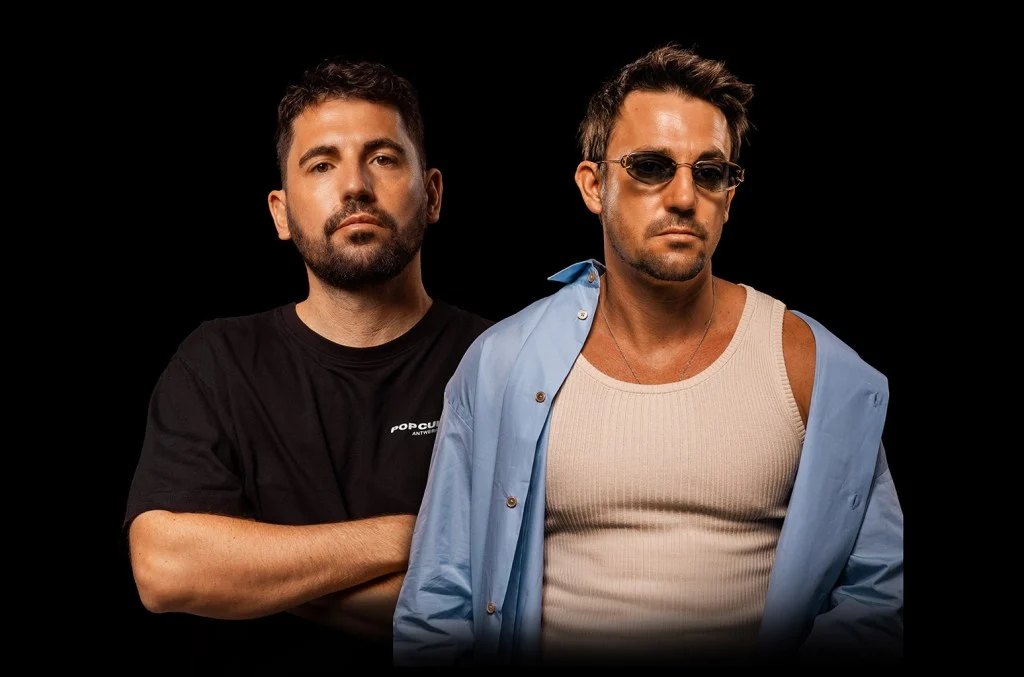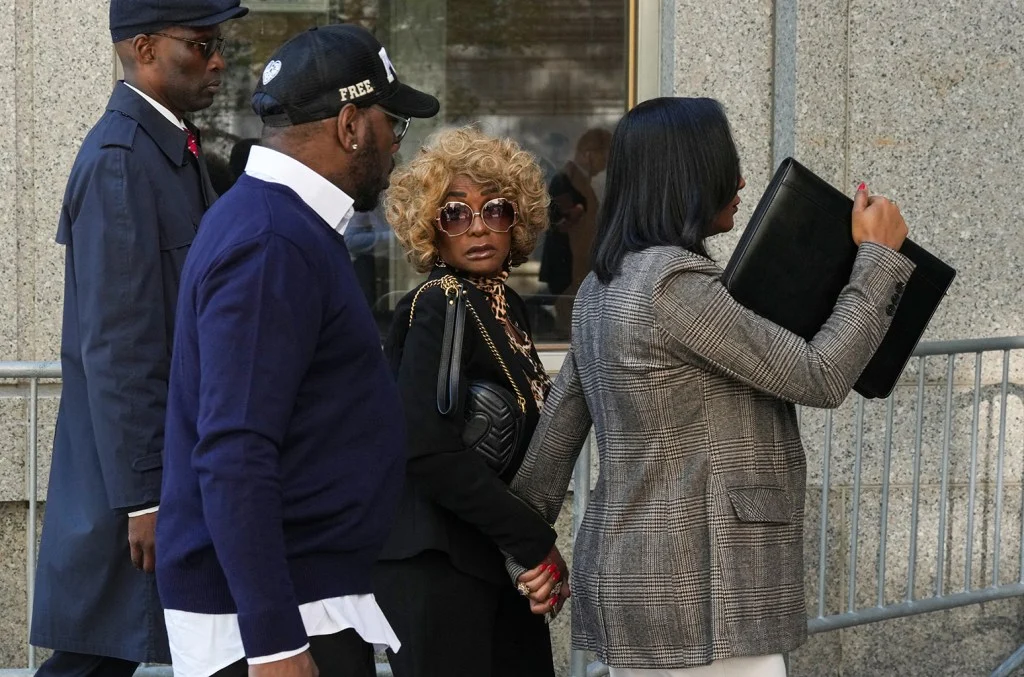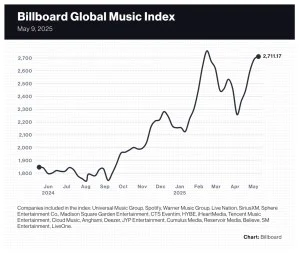Business
Page: 65
DJ duo Dimitri Vegas & Like Mike have signed with Independent Artist Group in all areas, including film and television for Dimitri Vegas Thivaios’ burgeoning acting career. The pair had previously been represented by CAA. Belgian-born brothers of Greek heritage, Dimitri Vegas & Like Mike made history as the first duo to be named the […]
The U.K. government’s plans to allow artificial intelligence firms to use copyrighted work, including music, have been dealt another setback by the House of Lords.
An amendment to the data bill which required AI companies to disclose the copyrighted works their models are trained on was backed by peers in the upper chamber of U.K. Parliament, despite government opposition.
The U.K.’s government has proposed an “opt out” approach for copyrighted material, meaning that the creator or owner must explicitly choose for their work not to be eligible for training AI models. The amendment was tabled by crossbench peer Beeban Kidron and was passed by 272 votes to 125 on Monday (May 12).
The data bill will now return to the House of Commons, though the government could remove Kidron’s amendment and send the bill back to the House of Lords next week.
Trending on Billboard
Kidron said: “I want to reject the notion that those of us who are against government plans are against technology. Creators do not deny the creative and economic value of AI, but we do deny the assertion that we should have to build AI for free with our work, and then rent it back from those who stole it.
“My lords, it is an assault on the British economy and it is happening at scale to a sector worth £120bn ($158bn) to the UK, an industry that is central to the industrial strategy and of enormous cultural import.”
The “opt out” move has proved unpopular with many in the creative fields, particularly in the music space. Prior to the vote, over 400 British musicians including Elton John, Paul McCartney, Dua Lipa, Coldplay, Kate Bush and more signed an open letter calling on U.K. prime minister Sir Keir Starmer to update copyright laws to protect their work from AI companies.
The letter said that such an approach would threaten “the UK’s position as a creative powerhouse,” and signatories included major players such as Sir Lucian Grainge (Universal Music Group CEO), Jason Iley MBE (Sony Music UK CEO), Tony Harlow (Warner Music UK CEO) and Dickon Stainer (Universal Music UK CEO).
A spokesperson for the government responded to the letter, saying: “We want our creative industries and AI companies to flourish, which is why we’re consulting on a package of measures that we hope will work for both sectors.”
They added: “We’re clear that no changes will be considered unless we are completely satisfied they work for creators.”
Sophie Jones, chief strategist office for the BPI, said: “The House of Lords has once again taken the right decision by voting to establish vital transparency obligations for AI companies. Transparency is crucial in ensuring that the creative industries can retain control over how their works are used, enabling both the licensing and enforcement of rights. If the Government chooses to remove this clause in the House of Commons, it would be preventing progress on a fundamental cornerstone which can help build trust and greater collaboration between the creative and tech sectors, and it would be at odds with its own ambition to build a licensing market in the UK.”
Candice Watkins has been named president of Capitol Records Nashville and executive vp of Capitol Christian Music Group.
Watkins’ new role comes as Capitol Music Group brings Capitol Christian Music Group (CCMG) and its country division, Capitol Records Nashville, under the Capitol Music Group Nashville umbrella. Artists who were previously signed to Capitol Records Nashville will remain at the newly formed Music Corporation of America (MCA) Nashville label.
Capitol Christian Music Group, which includes Motown Gospel and Tamla and distribution operations, will continue to be led by its longtime president, Nashville-based Brad O’Donnell, whowill continue to report to Tom March. CCMG is home to artists including Chris Tomlin, Anne Wilson, Tasha Cobbs Leonard and Josiah Queen; it also publishes the song catalog for gospel music luminary Kirk Franklin.
Watkins previously served as senior vp of marketing at Big Loud Records, working with artists including Morgan Wallen, HARDY, ERNEST, Stephen Wilson Jr. and Hailey Whitters. Prior to her work at Big Loud, Watkins served in marketing and artist development role at UMG Nashville and held positions at Red Light Management, Mozes Inc., Borman Entertainment and Cross Point Church.
Trending on Billboard
Capitol Music Nashville is located on Martin Street in the Wedgewood Houston area of Nashville in a 40,000-square-foot space that includes state-of-the-art recording studios, a live performance space and content studios. It will have the support of the Capitol Tower in Los Angeles for all label services.
“This reorganization reflects our commitment to growing our Nashville operations as a core creative hub in Christian, gospel and country music,” said Capitol Music Group CEO Tom March in a statement. “We’re looking forward to signing and developing the next generation of country artists on Capitol Records Nashville and are thrilled to have an executive of the caliber of Candice Watkins to lead our ambitious plans in country music while also bringing her expertise to our gospel and christian music operations.”
“This new structure will empower our Nashville executives to better serve the incredible artists on our roster. Candice is a brilliant music marketing executive who has an amazing track record in developing career artists,” said John Janick, chairman of Interscope Capitol. “Having her lead our country music business in Nashville and also add her extensive artist development expertise to our CCMG team is going to be great for our artists and for the entire executive team.”
Watkins commented: “It’s a true honor to step into the role of President of Capitol Records Nashville and EVP of Capitol Christian. These labels have a rich legacy in partnering with some of the most brilliant artists of our industry and I look forward to contributing to its continued success and cultural impact. Excited to collaborate with John, Tom, Lillia and Brad in boldly championing creatives and visionaries.”
On Friday (May 9), SoundCloud encountered user backlash after AI music expert and founder of Fairly Trained, Ed Newton-Rex, posted on X that SoundCloud’s terms of service quietly changed in February 2024 to allow the platform the ability to “inform, train, develop or serve as input” to AI models. Over the weekend, SoundCloud clarified via a statement, originally sent to The Verge and also obtained by Billboard, that reads in part: “SoundCloud has never used artist content to train AI models, nor do we develop AI tools or allow third parties to scrape or use SoundCloud content from our platform for AI training purposes.”
The streaming service adds that this change was made last year “to clarify how content may interact with AI technologies within SoundCloud’s own platform,” including AI-powered personalized recommendation tools, streaming fraud detection, and more, and it apparently did not mean that SoundCloud was allowing external AI companies to train on its users’ songs.
Trending on Billboard
SoundCloud seems to claim the right to train on people’s uploaded music in their terms. I think they have major questions to answer over this.I checked the wayback machine – it seems to have been added to their terms on 12th Feb 2024. I’m a SoundCloud user and I can’t see any… pic.twitter.com/NIk7TP7K3C— Ed Newton-Rex (@ednewtonrex) May 9, 2025
Over the years, SoundCloud has announced various partnerships with AI companies, including its acquisition of Singapore-based AI music curation company Musiio in 2022. SoundCloud’s statement added, “Tools like Musiio are strictly used to power artist discovery and content organization, not to train generative AI models.” SoundCloud also has integrations in place with AI firms like Tuney, Voice-Swap, Fadr, Soundful, Tuttii, AIBeatz, TwoShot, Starmony and ACE Studio, and it has teamed up with content identification companies Pex and Audible Magic to ensure these integrations provide rights holders with proper credit and compensation.
The company doesn’t totally rule out the possibility that users’ works will be used for AI training in the future, but says “no such use has taken place to date,” adding that “SoundCloud will introduce robust internal permissioning controls to govern any potential future use. Should we ever consider using user content to train generative AI models, we would introduce clear opt-out mechanisms in advance—at a minimum—and remain committed to transparency with our creator community.”
Read the full statement from SoundCloud below.
“SoundCloud has always been and will remain artist-first. Our focus is on empowering artists with control, clarity, and meaningful opportunities to grow. We believe AI, when developed responsibly, can expand creative potential—especially when guided by principles of consent, attribution, and fair compensation.
SoundCloud has never used artist content to train AI models, nor do we develop AI tools or allow third parties to scrape or use SoundCloud content from our platform for AI training purposes. In fact, we implemented technical safeguards, including a “no AI” tag on our site to explicitly prohibit unauthorized use.
The February 2024 update to our Terms of Service was intended to clarify how content may interact with AI technologies within SoundCloud’s own platform. Use cases include personalized recommendations, content organization, fraud detection, and improvements to content identification with the help of AI Technologies.
Any future application of AI at SoundCloud will be designed to support human artists, enhancing the tools, capabilities, reach and opportunities available to them on our platform. Examples include improving music recommendations, generating playlists, organizing content, and detecting fraudulent activity. These efforts are aligned with existing licensing agreements and ethical standards. Tools like Musiio are strictly used to power artist discovery and content organization, not to train generative AI models.
We understand the concerns raised and remain committed to open dialogue. Artists will continue to have control over their work, and we’ll keep our community informed every step of the way as we explore innovation and apply AI technologies responsibly, especially as legal and commercial frameworks continue to evolve.”

A modern iteration of Grammy-winning band The Kingston Trio is suing a Los Angeles music attorney for fraud, saying he lied about having an “inside track” to book the folk group at the Greek Theatre last summer.
The lawsuit was filed in California federal court on Friday (May 9) by Trident Concert Productions LLC, a concert promotion company for the lineup that performs as The Kingston Trio following the death of all the legendary folk band’s original members.
The new Kingston Trio claims it retained music lawyer David A. Helfant back in 2023 to help the group secure concert dates at Los Angeles’ famed Greek Theatre the following summer. According to the lawsuit, Helfant promised that he had an “inside track” for booking acts at the venue.
Trending on Billboard
“Helfant did not have expertise or the inside track or any superior knowledge about how to secure concert dates at the Greek Theater,” writes the group’s current attorney, Konrad L. Trope. “Instead, Helfant created an overinflated bill, along with convincing Trident that it needed to retain a former Greek Theatergeneral manager who could provide inside access.”
The group claims Helfant fraudulently convinced them to pay a hefty $650 per hour billing rate, plus $10,000 to a consultant who supposedly could help “grease the wheels” at the Greek Theatre.
In reality, says The Kingston Trio, neither Helfant nor his consultant had any “inside track.” But that didn’t even matter; according to the group, the Greek Theatre actually has a transparent booking protocol that allows anybody to bid for dates online.
The group was eventually able to secure two August 2024 dates at the Greek Theater using this public bidding system. But the group claims Helfant’s misdeeds delayed the booking process significantly, giving them only seven months to promote the shows.
“Helfant did not help, but rather hindered plaintiff’s efforts,” the lawsuit says.
To make matters worse, the group claims Helfant also spent precious hours pitching his other clients to work as cinematographers on a concert documentary that was to be filmed during the shows, but the pitches lacked proper disclosures about the regulations around private film investors, the lawsuit alleges.
The Kingston Trio is suing Helfant for breach of contract and fraud and asking for at least $250,000 in damages.
Reached for comment on Monday (May 12), Helfant tells Billboard that the allegations in the lawsuit are “are completely without merit.”
“I am confident that when the facts come to light in this action, I will prevail,” says Helfant.
The Kingston Trio, established by Bob Shane, Dave Guard and Nick Reynolds in San Francisco in the 1950s, charted 17 folk songs on the Billboard Hot 100 and won two Grammy Awards for its No. 1 hit, “Tom Dooley.”
All three original members of The Kingston Trio have died, with Shane the last to pass away in 2020. The group continues to perform under a new lineup that’s currently made up of Mike Marvin, Tim Gorelangton and Buddy Woodward.
The Trump Administration fired U.S. Register of Copyrights Shira Perlmutter on Saturday (May 10), sparking concerns in the music business that the White House will take the side of technology companies in debates about AI and copyright.
The move came just two days after the dismissal of Perlmutter’s boss, Librarian of Congress Carla Hayden, and a day after the Copyright Office posted a report on the legal issues in training AI algorithms on copyrighted works. Although the White House has not given any reason for the move, it comes as the media business once again finds itself in conflict with Silicon Valley – this time as technology companies have far more influence in Washington.
The Register of Copyrights reports to the Librarian of Congress, and speculation on the reason for Hayden’s May 8 firing varied. Hayden, appointed by President Obama, was the first African-American and woman to hold the position, leading some to view her dismissal as politically motivated. At a May 9 press conference, the White House suggested that “there were quite concerning things that she had done at the Library of Congress,” involving DEI and “putting inappropriate books in the library for children” — although the institution isn’t a lending library, let alone one that’s set up for young readers.
Trending on Billboard
Perlmutter’s subsequent dismissal suggests that the Trump administration may be more concerned with copyright policy – and that Hayden’s firing was at least partly a step toward changing the leadership of the Copyright Office. The Copyright Office has the power to issue guidance on the state of copyright law and report to lawmakers on related legislation, and judges often use its interpretations in court decisions. Currently, the office is preparing a multi-part report, “Copyright and Artificial Intelligence,” the third part of which, about whether scanning works to train AI algorithms would qualify as infringement, was expected to come out this spring. Given the number of court cases involving this issue, as well as the potential damages faced by technology companies in them, the stakes are high.
Late on Friday (May 9), the Copyright Office posted online a “pre-publication version” of the report, which is not its usual practice. Although the issues are complicated, it interprets the law in a way that suggests such copying – especially for commercial purposes, involving generative AI products – would not qualify as fair use. The Copyright Office has no lawmaking power, but courts could be influenced by its analysis of case law.
The next day, according to several sources, Perlmutter received an email telling her she was terminated.
There has been some speculation that Perlmutter’s dismissal was the result of the decision to post the report. However, several sources who had no direct knowledge of the situation, pointed out that Perlmutter might have known her dismissal was imminent, or at least possible, and had the report posted before that occurred. (Right now, no one knows, and neither the White House nor Perlmutter has commented.) And while the report is generally seen to favor rightsholders, it is an expert interpretation of existing law, not a set of policy recommendations.
Certainly, the issue of whether scanning works to train AI qualifies as fair use or copyright infringement has become a hot one. And since the early days of the second Trump administration, music and media lobbyists have worried about the influence of the technology business. In March, the venture capital firm Andreessen Horowitz responded to a request for public comments on the White House AI Action Plan by saying that “neither the Copyright Office nor any other government agency should release guidance related to this issue—or other issues critical to American competitiveness in AI—until the conclusion of the National AI Action Plan process.”
In late April, the right-wing American Accountability Foundation accused both Hayden and Perlmutter of being “deep-state liberals” and suggested that the Trump Administration “return an America First agenda to the nation’s intellectual property regulation.” Although both are Democrats, Perlmutter served in the first Trump Administration as the head of copyright policy in the United States Patent and Trademark Office, which is part of the Department of Commerce. Copyright has generally been one of the few non-partisan issues in Washington, since it usually unites Democrats who support the arts with Republicans who favor strong protections for property rights.
Perlmutter’s firing is likely to intensify the copyright debate, potentially creating a rift between Silicon Valley venture capitalists aligned with the Trump administration and Democrats, as well as some Republicans, who support copyright protections and believe in the independence of government agencies. Immediately after Perlmutter’s dismissal, Rep. Joe Morelle (NY-25) released a statement calling Trump’s termination of Perlmutter “a brazen, unprecedented power grab with no legal basis.”
The sex trafficking trial of Sean “Diddy” Combs kicked off Monday in a Manhattan federal courthouse, where federal prosecutors told jurors that the once-powerful mogul used his music empire for decades to “feed his every desire.”
On the first day of a trial expected to last two months, prosecutors painted a picture of a man who used “coercive and criminal conduct” to force at least two women to engage in drug-fueled sex parties called “freak offs.”
“For twenty years, the defendant, with the help of his trusted inner circle, committed crime after crime,” prosecutor Emily A. Johnson told the jury during her opening statements. “That’s what we’re here about today. That’s what this case is about.”
Trending on Billboard
Responding for Combs was defense attorney Teny Geragos, who admitted that the star had a “toxic” relationship with former girlfriend Cassie Ventura — including openly acknowledging that it included “domestic violence” — but said he was simply not guilty of racketeering or sex trafficking.
“Sean Combs is a complicated man, but this is not a complicated case,” Geragos told the jury. “We take full responsibility that there was domestic violence. Domestic violence is not sex trafficking.”
Combs was indicted in September, charged with running a sprawling criminal operation that aimed to “fulfill his sexual desires.” The case centers on elaborate “freak off” parties in which Combs and others would allegedly ply victims with drugs and then coerce them into having sex, as well as on alleged acts of violence to keep victims silent.
The star, once one of the music industry’s most powerful men, is formally accused of racketeering conspiracy, sex trafficking, and violating a federal prostitution statute. If convicted on all of the charges, Combs faces a potential life prison sentence.
At opening statements, prosecutors accused Combs of victimizing at least two women, including Cassie and an unnamed victim listed under a Jane Doe pseudonym. They said he used “lies, drugs, threats, and violence” to coerce the women into routinely engaging in sex with male sex workers in “dark hotel rooms.”
To keep both women silent, Johnson told the jury that Combs threatened to release videos of the encounters, one of many moves that she said kept them under his control: “It had the power to ruin her life.”
But Geragos told a very different story, repeatedly stressing that Cassie and other alleged victims had consensually chosen to have relationships with Combs and partake in what she termed his “swinger lifestyle.”
“That may not be what you like to do in your bedroom,” Geragos told the jurors. “She was not being trafficked.”
The trial will continue Monday afternoon, potentially with testimony from Cassie herself.
Billboard will update this story with more details from the trial as it unfolds.
Red Hot Chili Peppers frontman Anthony Kiedis is launching his own coffee brand, and he’s turning to Live Nation for help getting it in front of coffee drinkers.
Today, Kiedis and longtime friend Shane Powers are debuting their coffee in a can consumer brand JOLENE along with a marketing campaign, which a press release says is “built to move with the rhythm of live entertainment and meet the ambition of those living life to the fullest.”
Kiedis and Powers have partnered with Live Nation as both an investor and distribution partner for JOLENE. The global concert promoter will carry the coffee brand at its festivals and 40 amphitheaters owned or operated by Live Nation, including the Gorge Amphitheater in Washington, Northwell at Jones Beach Theater in New York and Allianz Amphitheater at Riverfront in Richmond, Virginia.
Trending on Billboard
Live Nation is an equity investor in JOLENE as is consumer spirits company Global Brand Equities and h.wood Group founder John Terzian. The agreement is similar to one Live Nation struck with water company Liquid Death in 2021 and its celebrity ownership group that included Wiz Khalifa, Machine Gun Kelly, Steve Aoki and Tony Hawk. That agreement had Live Nation selling Liquid Death at its 120 owned-and-operated venues as part of a larger sustainability effort to phase out the sale of single-use plastics at all owned and operated venues and events.
JOLENE comes in two flavors: Black (cold brew) and White (oat milk latte) and will be used to make four signature cocktails at Live Nation-owned venues. According to a press release, JOLENE is sourced through an all-female co-op in Peru, “ensuring high-quality beans while directly supporting the women growers and their communities,” the release reads. The product is also available for purchase online at retailers in Los Angeles and New York.
The origin of the coffee goes back several years, according to Kiedis. “Shane shouted at me down the sidewalk ‘Let’s do something!’ I shouted back ‘how ’bout coffee’? He said ‘done.’ And so began the adventure of putting a high-quality spin on a can of coffee.”
The name JOLENE is a spin on the phrase “cup of Joe” and the common descriptor “skinny latte” or “lean latte” referring to a latte without whole milk, as well as a reference to the hit country music song “Jolene” by Dolly Parton.
Russell Wallach, Live Nation’s global president of Media & Sponsorship added “Fans want options that fit the pace and energy of live music,” noting, “Cold brew has come up again and again, and JOLENE delivers — it’s high quality, easy to enjoy, and adds something new to the fan experience. It’s one more way we’re evolving to meet what fans are asking for.”

On Friday afternoon, the U.S. Copyright Office released a report examining copyrights and generative AI training, which supported the idea of licensing copyrights when they are used in commercial AI training.
On Saturday (May 10), the nation’s top copyright official – Register of Copyrights Shira Perlmutter – was terminated by President Donald Trump. Her dismissal shortly follows the firing of the Librarian of Congress, Carla Hayden, who appointed and supervised Perlmutter. In response, Rep. Joe Morelle (D-NY) of the House Administration Committee, which oversees the Copyright Office and the Library of Congress, said that he feels it is “no coincidence [Trump] acted less than a day after [Perlmutter] refused to rubber-stamp Elon Musk’s efforts to mine troves of copyrighted works to train AI models.”
This report was largely seen as a win among copyright owners in the music industry, and it noted three key stances: the Office’s support for licensing copyrighted material when a “commercial” AI model uses it for training, its dismissal of compulsory licensing as the correct framework for a future licensing model, and its rejection of “the idea of any opt-out approach.”
Trending on Billboard
The Office affirms that in “commercial” cases, licensing copyrights for training could be a “practical solution” and that using copyrights without a license “[go] beyond established fair use boundaries.” It also notes that some commercial AI models “compete with [copyright owners] in existing markets.” However, if an AI model has been created for “purposes such as analysis or research – the types of uses that are critical to international competitiveness,” the Office says “the outputs are unlikely to substitute” for the works by which they were trained.
“In our view, American leadership in the AI space would best be furthered by supporting both of these world-class industries that contribute so much to our economic and cultural advancement. Effective licensing options can ensure that innovation continues to advance without undermining intellectual property rights,” the report reads.
While it is supportive of licensing efforts between copyright owners and AI firms, the report recognizes that most stakeholders do not hold support “for any statutory change” or “government intervention” in this area. “The Office believes…[that] would be premature at this time,” the report reads. Later, it adds “we agree with commenters that a compulsory licensing regime for AI training would have significant disadvantages. A compulsory license establishes fixed royalty rates and terms and can set practices in stone; they can become inextricably embedded in an industry and become difficult to undo. Premature adoption also risks stifling the development of flexible and creative market-based solutions. Moreover, compulsory licenses can take years to develop, often requiring painstaking negotiation of numerous operational details.”
The Office notes the perspectives of music-related organizations, like the National Music Publishers’ Association (NMPA), American Association of Independent Music (A2IM), and Recording Industry Association of America (RIAA), which all hold a shared distaste for the idea of a future compulsory or government-controlled license for AI training. Already, the music industry deals with a compulsory license for mechanical royalties, allowing the government to control rates for one of the types of royalties earned from streaming and sales.
“Most commenters who addressed this issue opposed or raised concerns about the prospect of compulsory licensing,” the report says. “Those representing copyright owners and creators argued that the compulsory licensing of works for use in AI training would be detrimental to their ability to control uses of their works, and asserted that there is no market failure that would justify it. A2IM and RIAA described compulsory licensing as entailing ‘below-market royalty rates, additional administrative costs, and… restrictions on innovation’… and NMPA saw it as ‘an extreme remedy that deprives copyright owners of their right to contract freely in the market, and takes away their ability to choose whom they do business with, how their works are used, and how much they are paid.’”
The Office leaves it up to the copyright owners and AI companies to figure out the right way to license and compensate for training data, but it does explore a few options. This includes “compensation structures based on a percentage of revenue or profits,” but if the free market fails to find the right licensing solution, the report suggested “targeted intervention such as [Extended Collective Licensing] ECL should be considered.”
ECL, which is employed in some European countries, would allow a collective management organization (CMO) to issue and administer blanket licenses for “all copyrighted works within a particular class,” much like the music industry is already accustomed to with organizations like The MLC (The Mechanical Licensing Collective) and performing rights organizations (PROs) like ASCAP and BMI. The difference between an ECL and a traditional CMO, however, is that under an ECL system, the CMO can license for those who have not affirmatively joined it yet. Though these ECL licenses are still negotiated in a “free market,” the government would “regulat[e] the overall system and excercis[e] some degree of oversight.”
While some AI firms expressed concerns that blanket licensing by copyright holders would lead to antitrust issues, the Copyright Office sided with copyright holders, saying “[the] courts have found that there is nothing intrinsically anticompetitive about the collective, or even blanket, licensing of copyrighted works, as long as certain safeguards are incorporated— such as ensuring that licensees can still obtain direct licenses from copyright owners as an alternative.”
This is a “pre-publication” version of a forthcoming final report, which will be published in the “near future without any substantive changes expected,” according to the Copyright Office. The Office noted this “pre-publication” was pushed out early in an attempt to address inquiries from Congress and key stakeholders.
It marks the Office’s third report about generative AI and its impact on copyrights since it launched an initiative on the matter in 2023. The first report, released July 31, 2024, focused on the topic of digital replicas. The second, from Jan. 29, 2025, addressed the copyright-ability of outputs created with generative AI.
Led by two entertainment companies in the Dolan family portfolio, music stocks collectively eked out a small gain this week, marking their fifth consecutive weekly gain after a Trump tariff-induced two-week slide in early April.
Sphere Entertainment Co. shares jumped 18.9% to $28.05 after the company’s quarterly earnings on Thursday (May 8) showed that the Sphere venue’s cost management helped offset a 12.8% decline in revenue. CEO James Dolan told analysts he isn’t concerned about a possible downturn in tourism from a sluggish U.S. economy or a drop in international visitors. “When it comes to concerts,” he said, “demand exceeds capacity, so we have room to absorb any issues.”
MSG Entertainment, another Dolan family-controlled company, rose 7.7% to $33.59 after the company’s quarterly earnings report on Tuesday (May 6) showed a 6% revenue increase and steady consumer spending despite a decrease in event-related revenue due to fewer events. JP Morgan maintained both its “neutral” rating and $41 price target.
The 20-company Billboard Global Music Index (BGMI) rose 0.8% to 2,717.17, its second-highest mark and its first time above 2,700 since it closed at a record 2,755.53 the week ended Feb. 14. With five consecutive weeks in the black, the BGMI is up 10.2% since President Trump announced his tariff policy and set off a stock sell-off.
Music stocks outperformed the Nasdaq composite (down 0.3%), the S&P 500 (down 0.6%), the U.K.’s FTSE 100 (down 0.5%) and South Korea’s KOSPI composite index (up 0.7%). China’s SSE composite index gained 1.9%.
Universal Music Group, which reported earnings on April 29, received a healthy bounce this week, gaining 4.5% to 25.86 euros ($29.10). That brought its year-to-date gain to 13.0%.
Warner Music Group (WMG) shares fell 8% on Thursday after its quarterly earnings release and finished the week down 9.6% to $30.26. WMG stock was likely impacted by a 0.3% decline in streaming revenue, a metric closely watched by investors. The decline took WMG’s year-to-date loss to 11.8%. Numerous analysts reacted by decreasing their WMG price targets: Morgan Stanley (to $31 from $32), Barclays (to $28 from $31), UBS (to $38 from $41) and TD Cowen (to $36 from $41).
Radio companies enjoyed a positive week amidst uncertainty about the U.S. advertising market. The greatest gainer of the week was iHeartMedia, which jumped 18.9% to $1.06 ahead of the company’s first quarter earnings release on Monday (May 12). Year-to-date, the radio giant’s shares have fallen 40.8%. SiriusXM rose 5.4% to $20.47.
K-pop companies had a mixed week. YG Entertainment spiked 9.9% after the company reported large increases in both operating income and net profit in the first quarter. Elsewhere, HYBE rose 2.1% while SM Entertainment, which announced earnings on Wednesday (May 7), fell 0.9% and JYP Entertainment dropped 1.8%.
Secondary ticketing marketplace Vivid Seats (which is not listed on the BGMI) fell 33.9% to $1.79 after the company’s first quarter revenue plummeted 14% due to what CEO Stan Chia called “softening industry trends amidst economic uncertainty.” While Live Nation previously told investors it’s seeing strong demand for events later in 2025, Vivid Seats painted a different picture. The company suspended guidance for the full year and said it expects industry volumes to be flat or decrease in 2025. Previous guidance called for mid-to-high single-digit growth.
Billboard
Billboard
Billboard

 State Champ Radio
State Champ Radio 








